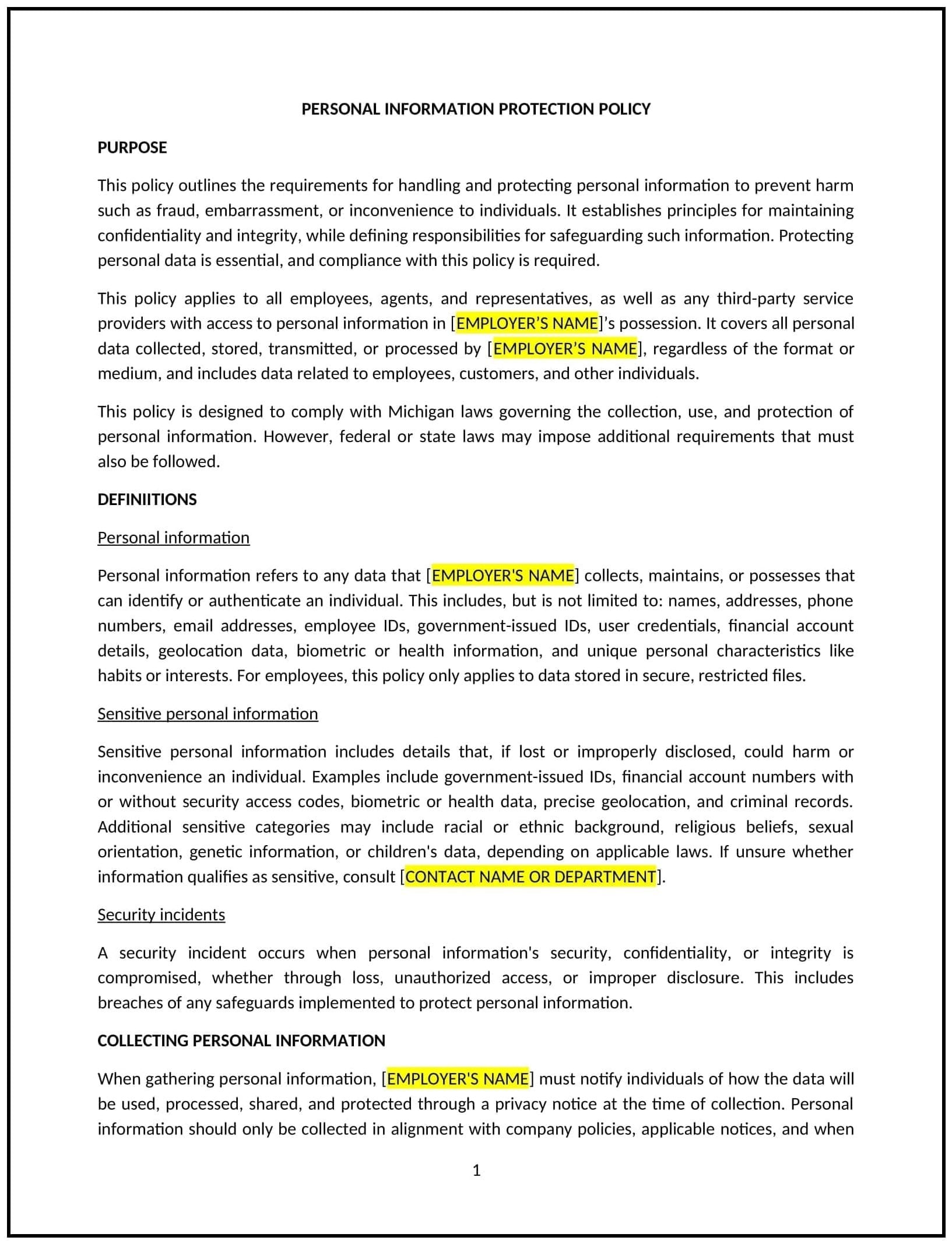Personal information protection policy (Michigan): Free template
Got contracts to review? While you're here for policies, let Cobrief make contract review effortless—start your free review now.

Customize this template for free
Personal information protection policy (Michigan)
A personal information protection policy provides Michigan businesses with guidelines for protecting the personal information of employees, customers, and other stakeholders. This policy outlines how businesses should collect, store, use, and disclose personal data, ensuring that they meet legal requirements, including privacy laws and data protection regulations. It helps businesses safeguard sensitive information and maintain trust with employees and customers by demonstrating a commitment to data security and privacy.
By adopting this policy, businesses can reduce the risk of data breaches and protect their reputation.
How to use this personal information protection policy (Michigan)
- Define personal information: Clearly define what constitutes personal information, such as names, addresses, email addresses, Social Security numbers, financial data, and any other data that can identify an individual.
- Establish data collection practices: Outline the procedures for collecting personal information, including the methods for obtaining consent, the type of data to be collected, and how it will be used. Businesses should collect only the necessary data and inform individuals of its purpose.
- Implement data storage and access controls: Specify how personal information will be securely stored and who will have access to it. This may include using encrypted databases, implementing password protection, and limiting access to authorized personnel only.
- Set guidelines for data usage: Establish how personal information will be used within the organization, ensuring that it is only used for legitimate business purposes and in accordance with applicable laws.
- Outline data sharing practices: Specify how and when personal information may be shared with third parties, including any conditions or safeguards required. Businesses should ensure that personal information is only shared when absolutely necessary and that third parties comply with privacy standards.
- Address data retention: Define how long personal information will be retained and the process for securely disposing of data once it is no longer needed. This may involve deleting or anonymizing personal information to reduce the risk of unauthorized access.
- Ensure data security: Establish security measures to protect personal information from breaches, such as using firewalls, encryption, and secure communication channels. Employees should be trained on data security best practices to prevent data leaks or unauthorized access.
- Notify individuals of breaches: Outline the procedures for notifying individuals in the event of a data breach, including timelines and the steps the business will take to mitigate damage.
- Review and update the policy regularly: Periodically review and update the policy to ensure it remains compliant with Michigan state laws, federal data protection regulations, and evolving business needs.
Benefits of using this personal information protection policy (Michigan)
This policy provides several key benefits for Michigan businesses:
- Protects customer and employee privacy: By safeguarding personal information, the policy helps protect the privacy of employees, customers, and other stakeholders, fostering trust and loyalty.
- Reduces legal and financial risks: The policy ensures compliance with Michigan state laws and federal regulations, such as the Michigan Consumer Protection Act and data protection laws, minimizing the risk of legal penalties or lawsuits due to data breaches.
- Strengthens business reputation: Demonstrating a commitment to protecting personal information enhances the business’s reputation and builds credibility with customers, partners, and employees.
- Prevents data breaches: The policy helps businesses implement security measures that reduce the risk of data breaches, which can cause significant financial and reputational damage.
- Increases operational efficiency: Clear guidelines for handling personal information help streamline data management processes, ensuring that data is used responsibly and securely.
Tips for using this personal information protection policy (Michigan)
- Communicate the policy clearly: Ensure that all employees are aware of the personal information protection policy by including it in the employee handbook, during onboarding, and through regular training sessions on data privacy.
- Provide data security training: Offer training on how to securely handle personal information, including how to recognize phishing attempts, avoid data leaks, and maintain confidentiality.
- Monitor data practices: Regularly monitor and audit data collection, storage, and sharing practices to ensure compliance with the policy and detect any potential issues before they become problems.
- Conduct regular risk assessments: Periodically assess the risks to personal information security, such as potential vulnerabilities in the company’s systems, and take steps to address them proactively.
- Review the policy regularly: Update the policy regularly to ensure it aligns with changes in Michigan state laws, federal data protection regulations, and best practices for handling personal information securely.